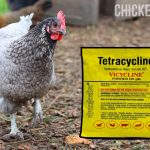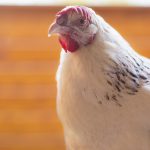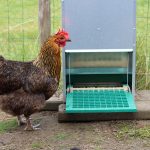Salmonella In Chickens: Risks And Transmission To Humans
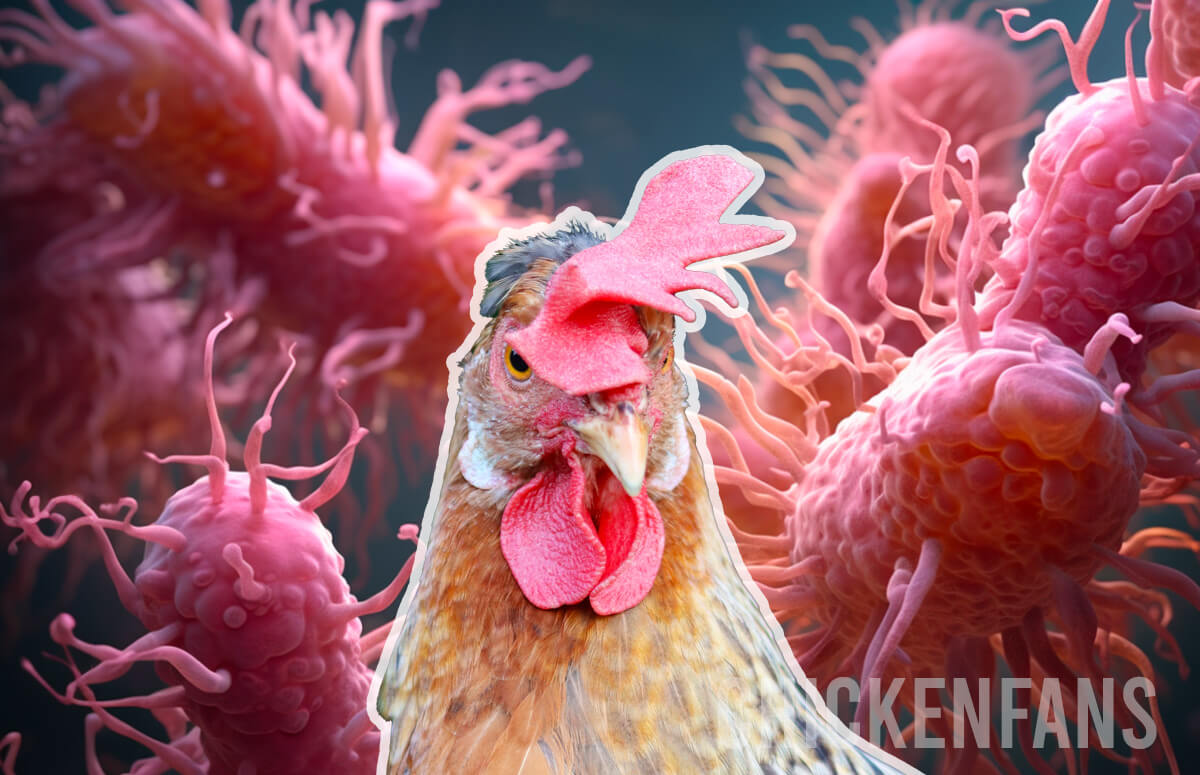
In this day and age of growing environmental consciousness, a growing number of people choose to keep chickens in their backyards. While keeping chickens holds many advantages, it is also important to keep potential health risks in mind. Salmonella and Campylobacter infections can be transmitted from poultry to humans and are a concern to keep in mind.
Let’s delve into the risks associated with keeping poultry and salmonella in chickens.
Can Chickens Get and Carry Salmonella?
Yes, chickens can get and carry Salmonella in their intestines. These pathogens can be naturally present in chickens and passed through their droppings. Even organically fed chickens can become infected. While chickens may not show symptoms, Salmonella causes health risks to humans, making proper hygiene essential when handling your flock.
Often appearing robust, live poultry can host Salmonella and Campylobacter germs in their excrement and on various parts of their bodies. These harmful microorganisms can contaminate the environment, including coops, bedding, and surrounding soil.
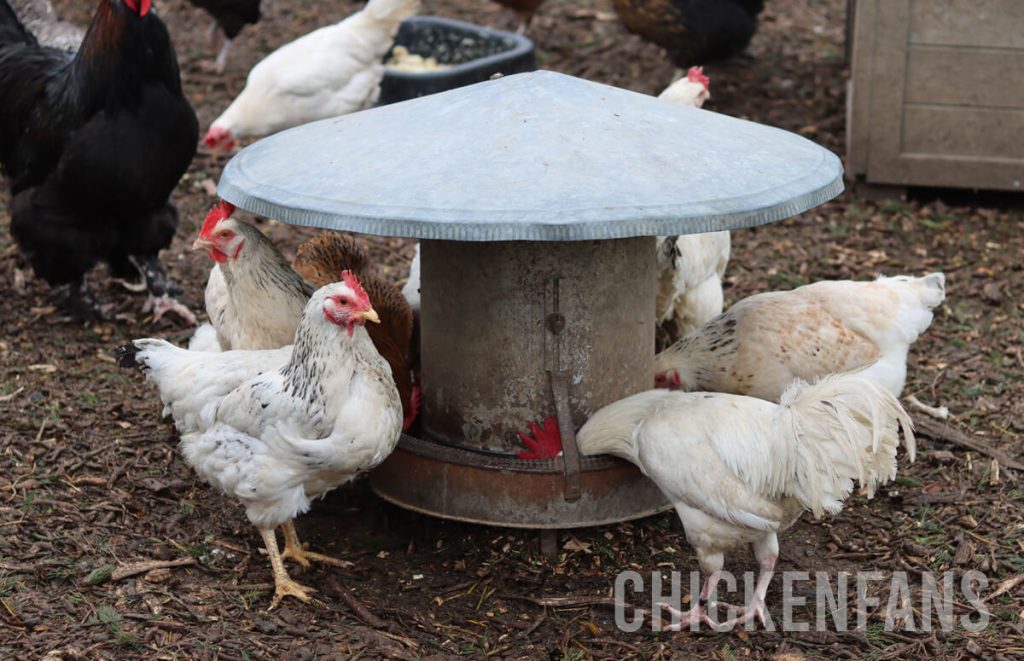
Moreover, these bacteria can cling to the hands, shoes, and clothing of those who care for the birds, potentially initiating an infection chain. Amongst the most vulnerable are children, who are particularly susceptible due to their developing immune systems.
What is Salmonella?
Salmonella is a bacteria that causes foodborne illness in humans. It commonly contaminates poultry, eggs, and other foods. A Salmonella infection leads to diarrhea, fever, abdominal cramps, and vomiting. It can range from mild to severe, and severe cases may require medical treatment, especially for those with weakened immune systems.
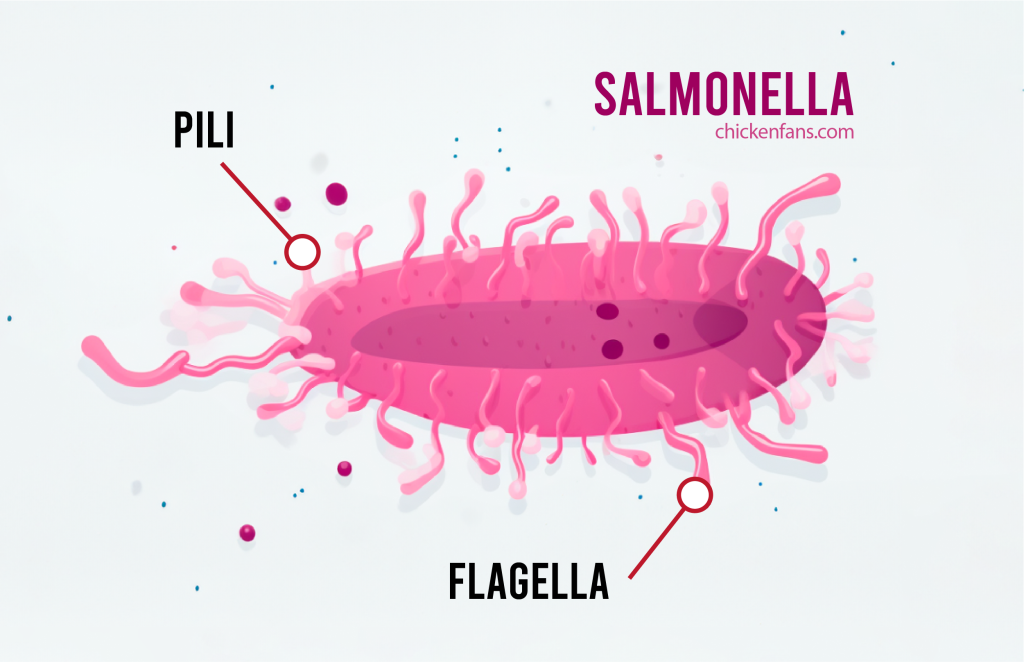
Salmonella bacteria are rod-shaped and have flagella to swim around, and pili help them stick to surfaces. Inside a Salmonella cell, you’ll find genetic material (DNA), ribosomes for making proteins, and a variety of enzymes and other molecules that help it function and survive.
How Do Chickens Get Salmonella?
There are several ways for a chicken to get infected with the Salmonella bacteria. It will primarily get it from one of the following ways:
- Environmental Contamination: Exposure to contaminated soil, bedding, water, or through feces of infected birds.
- Carrier Birds: Chickens can get Salmonella from other infected birds, even if they appear healthy. Many birds carry the bacteria without showing any symptoms.
- Contaminated Feed and Water: They can ingest the bacteria by drinking or feeding from contaminated sources. The contaminated feed may find its origin in the storage process or from contact with rodents or pests.
Can Chickens Transmit Salmonella to Humans?
Yes, chickens can transmit Salmonella to humans. Even chickens that may appear healthy can carry the bacteria in their intestines and droppings. Handling them or their surroundings without proper hygiene measures can lead to a Salmonella infection in humans.
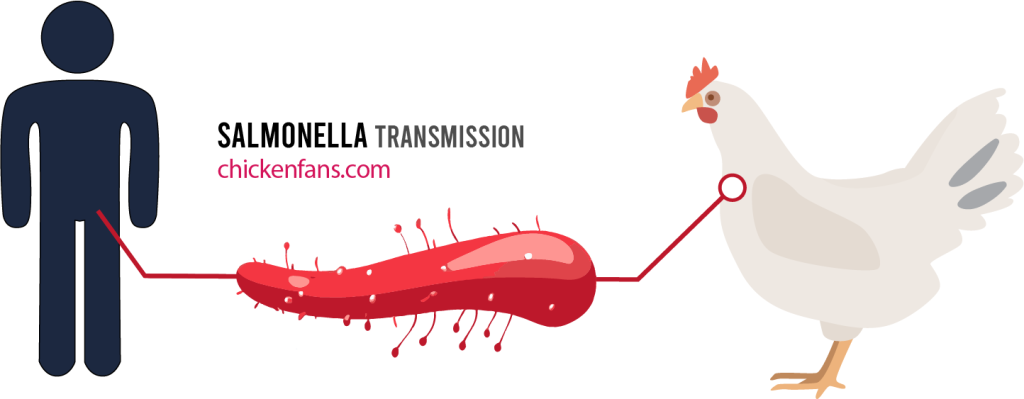
Next to handling live poultry, humans can also get salmonella by consuming raw or undercooked chicken meat. Salmonella bacteria can be present on the surface of the chicken or inside the meat.
A Salmonella infection can potentially be dangerous for humans, especially for those with weakened immune systems or vulnerable persons, like very young or very old people. Typical symptoms of a Salmonella infection include diarrhea, abdominal cramps, fever, and vomiting, which can lead to dehydration.
How Do Humans Get Sick From Salmonella-Infected Poultry?
When Handling Live Poultry:
Live poultry can carry Salmonella germs in their droppings, intestines, egg shells, or on their body. These bacteria can spread to the environment where the birds live and also cling to the hands or shoes of people caring for them. Infection occurs when people touch their mouths or consume food after contact with infected birds or their environment.
Children are at higher risk of contracting the illness. They are more likely to put their fingers into their mouths, and their immune system is still developing. It’s, therefore, crucial to take precautions when your children are handling your flock. Teaching them hand hygiene and adult supervision is key.
When Handling Raw Chicken Meat:
When consuming or handling raw and undercooked chicken meat, a Salmonella infection can occur. To prevent this infection, it’s crucial to practice some essential handling rules like avoiding cross-contamination, cooking the chicken meat properly, and practicing good hygiene.
Can Humans Get Salmonella From Eating Undercooked Chicken Meat?
Yes, humans can get Salmonella from consuming raw or undercooked chicken meat. The bacteria can be present on the surface of the meat or inside. If not appropriately heated to 165°F (74°C) or through cross-contamination, it can cause illness when consumed, leading to symptoms like diarrhea, fever, cramps, and vomiting.
How Salmonella Infections Trough Chicken Meat Occur:
- Contamination During Processing: Chickens may carry the Salmonella bacteria in their intestines. During processing, the bacteria can spread to the surface of the meat.
- Cross-Contamination: If raw chicken comes into contact with other food, utensils, or surfaces, contamination may occur, and the bacteria can be transferred.
- Inadequate Cooking: When chicken meat isn’t thoroughly cooked, the Salmonella bacteria can survive.
- Handling and Hygiene: Touching raw chicken and then touching your face, mouth, or other foods without proper handwashing can introduce Salmonella into your system.
Preventing Salmonella Infections From Raw Chicken
- Keep raw chicken separate from other food
- Use separate chopping board and utensils for raw chicken
- Wash your utensils, chopping boards, and hands thoroughly after handling raw chicken
- Cook chicken to the recommended safe temperature of 165°F (74°C)
- Do not consume raw or undercooked chicken
- Refrigerate chicken promptly after buying at proper temperatures
Symptoms of Salmonella Infection in Humans
Once a Salmonella infection is transmitted from chicken to human, it can result in a range of symptoms. These symptoms typically appear within 6 to 72 hours after exposure to the bacteria and can last a couple of days to a week.
- Diarrhea
- Fever
- Abdominal cramps
- Vomiting
- Headache
- Muscle pain
- Dehydration
Most symptoms are not too serious, but vulnerable individuals, like the elderly or small children, may develop more severe or persistent symptoms. In that case, medical attention may be necessary.
Preventing Salmonella Transmission From Chickens To Humans
As mentioned before, a Salmonella infection can potentially be dangerous for humans, and its symptoms are uncomfortable. Preventing a Salmonella transmission from your chickens to you or a family member is essential to maintain a healthy environment and still enjoy the benefits of keeping chickens.
- Hand Hygiene: Thoroughly wash your hands after handling chickens, eggs, feeders, or waterers. Use hand sanitizers if disinfecting soap and water aren’t available, but washing with soap and water is preferable.
- Supervise Children: Closes supervise handwashing for young children, and children under five years old should not handle chickens or their eggs.
- Keep Chickens Outside: Do not let your chickens inside the house, especially not in areas where food is prepared, served or stored.
- Avoid Eating Around the Chickens: To prevent contamination, refrain from eating or drinking in the area where chickens are.
- Proper Egg Handling: Collect eggs regularly and refrigerate them. Clean visibly dirty eggs with a dry cloth, but do not wash eggs with water before storing them, as you’ll wash away the protective layer around the egg. Washing chicken eggs is only beneficial right before using them in a raw egg recipe, like mayonnaise.
- Practice biosecurity: Implement strict biosecurity measures to minimize the risk of Salmonella contamination.
- Clean Equipment: Regularly clean and sanitize poultry equipment such as feeders, waterers, nesting boxes,… Clean them outside rather than inside to prevent contamination.
Summary
Salmonella can pose a significant risk to your health, and when keeping chickens, the risk is higher than usual. Chickens can carry these bacteria in their intestines, even if they appear healthy, and shed them in their droppings and around the eggshell.
Humans may quickly become infected through contact with contaminated surfaces, raw chicken meat, or chickens, leading to vomiting, fever, diarrhea, and cramps. Young children, the elderly, and people with weakened immune systems should not handle chickens or their surroundings as they are at higher risk of severe illness.

